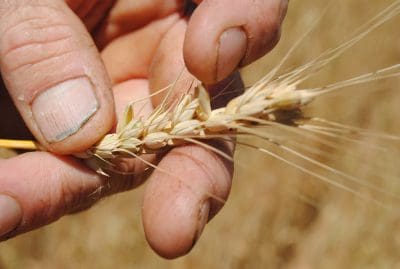WESTERN Australian growers should make assessments for frost risk paddock-by-paddock ahead of the 2017 cropping season, according to ConsultAg agronomist, Garren Knell.
Mr Knell told the Grains Research and Development Corporation (GRDC) Grains Research Update at Merredin that diversity and flexibility were keys to minimising the impact of frost on a farm business.
His advice comes after many significant frost events wiped an estimated three million tonnes, worth hundreds of millions of dollars, from Western Australia’s grain crops in 2016.
“While last year was an extraordinary year for frosts, generally we are getting more frost events, which tend to be colder, and the frost window is getting wider,” Mr Knell said.
“Other reasons we are seeing more damage to grain crops is that we are sowing earlier, there is less diversity of crop varieties and there are fewer long-season varieties.
“We have no influence on frost timing and severity, but we can influence exposure to any given frost event by mapping different areas for different management; managing financial exposure of the business; considering crop type and variety; and using time of sowing to help mitigate frost risk.”
Mr Knell advised growers to assess each paddock based on historical records, experience, position in the landscape and soil types – and then, once identified, map high-risk areas and manage them differently from other areas.
“When choosing crop types and varieties for high risk areas, it is worth considering longer season barley and wheats, and mixing wheat varieties within and between paddocks,” he said.
“Spreading out the sowing program is also important – you do not want to miss an early sowing opportunity but this does not mean you have to finish your whole seeding program by May 15.
“Diversity in the farming system – whether that’s sheep, canola, hay or oats – will ensure all your eggs are not in one basket and help mitigate the risk.”
Mr Knell said there were heavy stubble loads in paddocks this year which had been shown to increase frost risk in years of moderate frost.
“However, while research has shown that stubble management can be used as part of a comprehensive frost management plan, reducing stubble loads will not lessen damage in years of multiple, extreme events,” he said.
“Burn windrows where appropriate, but this needs to be balanced with conserving stubble to conserve moisture.”
Mr Knell said other research suggested soil with deficient or marginal potassium levels may increase vulnerability to frost, and he encouraged growers to check levels of this nutrient using soil or tissue tests.
“Fixing a potassium deficiency has benefits every year and if there is a frost event it may also help wheat tolerate frost better,” he said.
Mr Knell encouraged growers to understand their specific frost risk at a regional, farm, paddock and sub-paddock level, and to adapt their management appropriately, and said other key learnings to consider in frost management plans for frost susceptible areas included:
- Avoid sowing wheat in sandy-surfaced paddocks that are low in the landscape;
- Use nitrogen early with limited or no late nitrogen top-ups;
- Understand the preferred seeding window for varieties (for example, in frost prone areas late-April and early-May sowings of Mace are very high risk);
- Using a high seeding rate and growing a dense canopy can increase risk;
- Apply phosphorus at conservative rates (using soil test data) where frost risk is high or where cash-flow is tight following the impact of 2016;
- Grazing crops in winter can delay flowering time and change the frost risk of a paddock.
Information about tactics to manage spring frosts and links to useful resources are available in the GRDC Tips and Tactics publication Managing Frost Risk at http://www.grdc.com.au/ManagingFrostRisk.
Source: GRDC



HAVE YOUR SAY